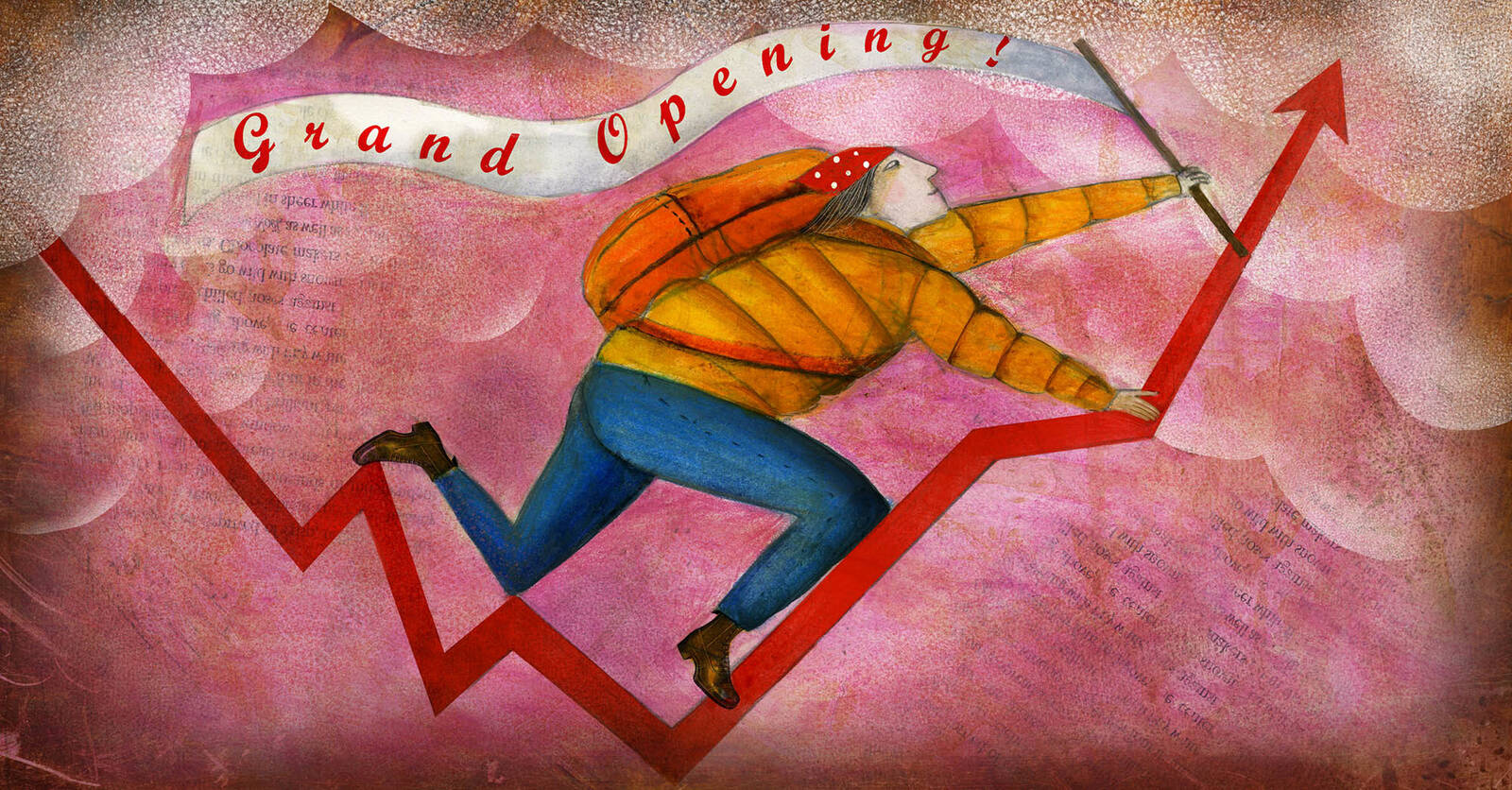Organizations Leadership Economics Jan 5, 2017
Businesses Born in a Recession Tend to Start Smaller and Stay Smaller
Yet there are ways business owners can counter these long-term effects.

Yevgenia Nayberg
What happens to companies born in a recession?
Recent graduates who begin jobs during an economic decline tend to earn less than those who start their careers in a booming market. And the difference can persist for more than a decade.
So Kellogg’s Sara Moreira wondered: Could economic circumstances have similar effects on startups?
Previous studies have looked at how young versus mature firms fared under different market conditions. But “no one had searched for a link between the size of a business over its entire lifetime and the economic conditions it faced when starting out,” says Moreira, an assistant professor of strategy at Kellogg.
In a recent study, she found that, indeed, companies that began in an economic downturn started on a smaller scale and remained smaller over their lifecycle than similar companies started during more robust times. But the effect, while pervasive, does not mean that starting a business in a recession is a bad idea, and Moreira offers some strategic advice for companies launched during economic downturns.
Persistent and Pervasive Effects
Not all businesses are created equal, regardless of the health of the economy at birth.
A vast array of companies—from mom-and-pop grocery stores, to jewelry makers on Etsy, to Silicon Valley’s venture capitalist-backed companies—launch in any economic climate. Nor are all industries shaped by the same forces. The growth of a Manhattan restaurant, for example, is spurred by different circumstances—such as Zagat ratings or proximity to a subway station—than the expansion of a grocery store in Iowa.
“You would expect that more productive firms are bigger and grow more—but I found the opposite effect here.”
So to ensure that her study compared apples to apples, Moreira compared data from companies within the same industries and locations.
Specifically, she gathered data from the Census Bureau on company formation and growth, noting the location, kind of industry, and organizational structure of every business in the United States between 1976 and 2011. She used a firm’s revenue and number of employees as indicators of its size and growth over time.
She found significant ramifications for businesses, depending on the economic climate in which they were started.
Businesses started during recession years, such as 2008, began smaller than those created during boom periods, such as in the mid 2000s. And they remained smaller throughout their lifetimes, growing 1.4 percent more slowly than businesses that started in more fortuitous times. This is a puzzling empirical finding because economic shocks that affect businesses later in their lifecycle are short-lived. This means that there is something different about the importance of economic conditions affecting businesses at entry, which have a permanent effect, versus the transitory effect of economic shocks later in their life.
“The key here is the persistence of this effect on startups,” Moreira says. “It really says there’s something different about how economic conditions affect a business at entry.”
Demand Drives Growth
But why does this happen?
Perhaps, she reasoned, workers laid off during a recession face a difficult job market and, instead of looking for a new position, might decide to start their own business. Those novice entrepreneurs may not be as successful as experienced business people. But when Moreira compared a firm’s revenue per employee—a measure of its productivity—within each industry, she found that recession-era startups performed at least as well as their boom-era counterparts.
“Businesses that enter [the market] during recessions are in fact more productive than those that enter in good times,” she says. “You would expect that more productive firms are bigger and grow more—but I found the opposite effect here.”
Next, Moreira looked at whether the cost of scaling up was to blame. Businesses opened during recessions often start small due to the lack of capital or investors. Finding a larger space or acquiring bigger equipment down the line can then prove more costly, making it tougher to expand. This effect should disproportionately affect industries with greater infrastructure costs—such as factories or restaurants that require machinery or square footage to expand—than those that need less infrastructure. But this was not the case either.
Lastly, Moreira considered a possibility that economists have typically thought to be less important than these other explanations: During a recession or economic downswing, firms have greater difficulty establishing a customer reputation and brand awareness, which limits their ability to grow later on.
She found her culprit.
She created a mathematical model to simulate the effects of economic changes. She found that a boom period enables startups to take advantage of higher consumer demand—driven by fuller pocketbooks—to build a larger clientele. This increases their future sales potential.
Consider a software company launched during the boom year of 2005. It would have captured a certain customer base. In later years, word of mouth, reviews, returning customers, and a positive perception of the company’s brand would further boost sales. A competitor that launched during the 2008 downturn, however, would have experienced lower demand in the first year thanks to fewer consumers. In later years, not as many customers would be likely to try its product, so the product would remain less well-known, and sales would never pick up in the same way. That lower demand could persist for years because of how the brand is perceived.
“If the two software products are exactly the same and people don’t really care about brand A versus brand B, they have a common demand,” Moreira explains. “But that is not the case. Consumers perceive brands differently—and consumer demand is a very important driver of many differences between firms.”
Countering Early Effects
Do these findings suggest that aspiring entrepreneurs should wait out a recession and only launch companies during healthy economic times? No, Moreira says.
“The magnitude of the difference needs to be way bigger to justify postponing a year’s worth of income,” she says. “It’s hard to say that a potential business entrant should just wait out a recession based on this difference.”
Instead, Moreira recommends that companies put greater efforts toward establishing a strong customer base in their early years. Investing in advertising and marketing can build a well-known brand early on. Offering promotions or other incentives to early adopters can also help attract more customers. In this way, startups can capture a larger market share early on, making it easier to expand that consumer base later.
“If there’s a way for the business to price its products better or do something else that helps capture more consumers in the first year,” Moreira says, “that may actually pay off in the future.”



